by Naomi L. | August 18, 2017 | J.C. Wolfe's Writing, Poetry |
So you want to be a writer,
But you don’t know where to start,
How to go from making scribbles
To creating works of art.
You have so many stories,
They could fill a hundred books.
But to finish even one
Is much harder than it looks.
So you want to be a writer,
But you don’t know what to do
When a block forms in your mind
And the words just won’t come through.
You sit and stare in silence
At the blank page on your screen.
You’ve discovered it’s a struggle
Just to write a single scene.
So you want to be a writer,
But you’re overwhelmed with fear
That nobody will appreciate
The work you hold so dear.
So you start procrastinating
And you break your writing streak.
Now your writing days are scarce
And your dream is looking bleak.
But to truly be a writer
Takes a dream and so much more.
And you may think you’re alone,
But we’ve all been there before.
We’ve all been through the struggles
And we’ve all endured the pain.
We’ve faced so many rejections
That we’ve nearly gone insane.
But still we keep creating
And we don’t give up the fight,
For the world needs all our stories
To be brought into the light.
So put your pen to paper
And your fingers to the keys.
Always keep the stories coming.
Write as many as you please.
Don’t let anybody tell you
This is not who you should be,
For to truly be creative
Means to set your spirit free.
And the truth is just by writing,
You’ve already come so far.
So you want to be a writer?
My friend, you already are!
by Naomi L. | August 16, 2017 | Blog, Creative Writing, Featured |
So you’ve just started writing fiction, but you’re not sure you’ve got what it takes. You’re afraid you’ll fail, that you’ll make a ton of writing mistakes and you’ll never be that amazing artist you hope to be someday. Or worse, maybe you think you’ll kill it as soon as you start, and your writing will be so awesome right out of the gate that you’ll never have to practice and improve (only to wonder years down the road why no one ever reads your incredible stories). Whether you suffer from imposter syndrome or unfounded arrogance, your expectations of writing are unreal.
Because guess what? Every writer makes mistakes! That’s how we learn and get better at our craft. But if you want to avoid learning some lessons the hard way (and I don’t blame you), it never hurts to turn to writing resources for help. So for all you blossoming writers out there, here are six common writing mistakes you’re bound to make at least once. Keep an eye out for these the next time you sit down to write!
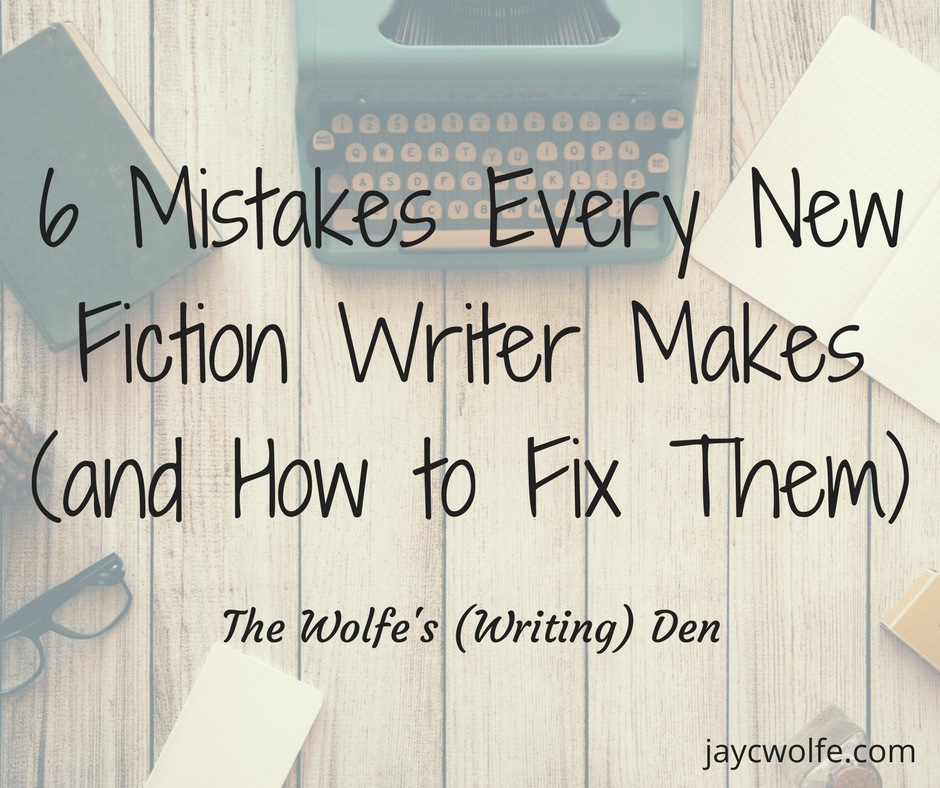
Writing Mistake #1: Stopping at the first draft (i.e. not editing)
The first draft of anything is sh*t. – Ernest Hemingway
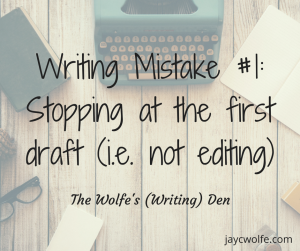 Let’s get this one out of the way first. A common mistake many new fiction writers make (including me when I started) is to write a full story, then set it aside and never touch it again. An important rule of fiction writing: Every piece must go through editing before it’s finished. To be fair, this isn’t as big a deal with private writing, but it’s still good practice for when you’re ready to start sharing your work.
Let’s get this one out of the way first. A common mistake many new fiction writers make (including me when I started) is to write a full story, then set it aside and never touch it again. An important rule of fiction writing: Every piece must go through editing before it’s finished. To be fair, this isn’t as big a deal with private writing, but it’s still good practice for when you’re ready to start sharing your work.
The truth is nothing you write is going to be perfect the first time around. Never assume you’ve created a masterpiece on your first try; even the greatest authors in the world need editors to help them shape their writing into publishable work. Heck, the blog post you’re reading now went through several rounds of revisions before I published it, and it still isn’t perfect!
So don’t stress about making something awesome right away. If anything, let this fact take away the pressure of having to write well all the time. Just write first, worry about making it publishable later. That’s what editing is for.
How to fix this writing mistake
Edit! Edit like your life depends on it, because your story’s life does. Readers don’t appreciate stories because they come out brilliant on the first try, but because the writer took the time to shape that first idea into a polished piece of art. Always make sure your work is worthy of publication before you share it. Need help? You don’t have to do it all alone; that’s what editors are paid for!
Writing Mistake #2: Using flowery language (i.e. purple prose)
Eschew surplusage. – Mark Twain, “Fenimore Cooper’s Literary Offenses” (1895)
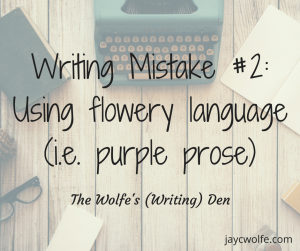 There’s this myth among beginning writers that the best way to be taken seriously is to sound as smart as possible. Maybe you’re insecure about your limited knowledge and vocabulary, so you stuff your stories with fancy words and fluffy sentences, then pat yourself on the back for creating distinguished and eloquent prose. Surely now you’ve proven yourself a great writer, right?
There’s this myth among beginning writers that the best way to be taken seriously is to sound as smart as possible. Maybe you’re insecure about your limited knowledge and vocabulary, so you stuff your stories with fancy words and fluffy sentences, then pat yourself on the back for creating distinguished and eloquent prose. Surely now you’ve proven yourself a great writer, right?
Wrong. While you may think all that fancy writing will give you credibility, you’ve actually just exposed yourself as an amateur. This common writing mistake is known as purple prose, and it can kill your story before it even starts. Counterintuitive as it sounds, using “smart” words and flowery language actually has the opposite effect of driving readers away, because the only people who waste their time reading stories they can’t understand are high school students trying to pass English. Everyone else wants a good story, not a vocabulary lesson.
Purple prose comes in a variety of flavors:
- big, difficult, pretentious words;
- flowery detail;
- too many adjectives and adverbs;
- said bookisms (only using words other than “said” as dialogue tags); and
- exaggerated sentiment (trying to “force” readers to feel certain emotions).
If you’re guilty of making any of these mistakes, stop and rewind. When you edit, make every effort to weed out the purple and strip your story down to the bare bones. You may have trouble getting used to this style, but in time you’ll find that concise and direct writing is the most effective form of storytelling.
How to fix this writing mistake
Replace big words and phrases with simpler ones, remove unnecessary adjectives, and cut out details that do nothing for your story. The idea is to sound as natural and direct as possible so you’ll connect with your readers. When in doubt, read your work out loud; if a word or phrase sounds strange, like something you’d never say in real life, delete it or replace it with a more common alternative.
Writing Mistake #3: Getting crazy with the punctuation!!!
Jake: Ok, I’m excited. I just don’t happen to like exclamation points.
Elaine: Well, you know, Jake, you should learn to use ’em! Like the way I’m talking right now, I would put exclamation points at the ends of all of these sentences! On this one! And on that one!
– Seinfeld (Season 5, Episode 4 – The Sniffing Accountant)
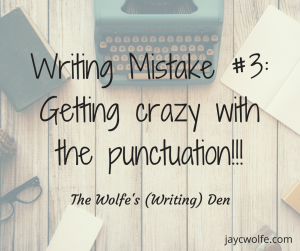 Of all the ridiculous situations in Seinfeld‘s nine-season run, few top the time Elaine screwed up her relationship over punctuation. The irony: her boyfriend was a writer whose book she was editing, and he was probably right not to use those exclamation points.
Of all the ridiculous situations in Seinfeld‘s nine-season run, few top the time Elaine screwed up her relationship over punctuation. The irony: her boyfriend was a writer whose book she was editing, and he was probably right not to use those exclamation points.
When writing fiction, punctuation is something you don’t want to mess up, because this mistake translates as lazy or incompetent writing. Trust me on this: As much as a scene calls for over-the-top excitement, you don’t need three exclamation points to get your point across. When you overuse punctuation, you’re conveying one of two messages to your reader:
- you don’t trust your writing enough to express emotion through words alone, or
- you don’t trust the reader to grasp the emotion in your words without help.
Either way, it doesn’t make you look good. Writers should always take care not to patronize their audience, and one of the easiest ways to do that is by using exclamation points and other punctuation marks where you don’t need them. That’s not to say you should avoid them altogether; you just shouldn’t use them as a crutch. Instead, trust your words to convey the right messages and emotion on their own. Remember that punctuation is simply an organizational tool; the focus should always be on your words.
How to fix this writing mistake
Stick to normal punctuation. Use exclamation points sparingly, avoid multiple punctuation, and know how to use commas, apostrophes, colons, semicolons, and hyphens correctly. When in doubt, turn your work over to a proofreader.
Writing Mistake #4: Writing dialogue that falls flat
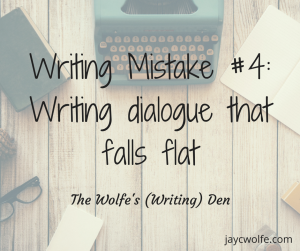 I confess: even after writing fiction for nearly my whole life, I still have trouble with dialogue. Maybe it’s because I’m shy and have little experience talking to people, but this seems to be my Achilles heel when it comes to writing stories. If you feel this is your weak point too, don’t worry, you’re not alone. In fact, dialogue is so hard to get right that this writing mistake could take up its own blog post, but for the sake of brevity, let’s focus on the main point.
I confess: even after writing fiction for nearly my whole life, I still have trouble with dialogue. Maybe it’s because I’m shy and have little experience talking to people, but this seems to be my Achilles heel when it comes to writing stories. If you feel this is your weak point too, don’t worry, you’re not alone. In fact, dialogue is so hard to get right that this writing mistake could take up its own blog post, but for the sake of brevity, let’s focus on the main point.
In a nutshell, dialogue is difficult to write well because it’s not quite speech and not quite narrative, but instead constitutes a class of its own. We think differently when we speak than when we write, so it takes a lot of practice to master the balance between both. Writing good dialogue involves removing the boring parts of everyday speech—pauses, ums, stutters, etc.—and refining it to a form that reads naturally while still conveying information relevant to the story. And while this may sound simple on the surface, it can take years of practice to learn how to:
- cut out the unnecessary parts of speech,
- make characters sound natural,
- give each character a distinct voice, and
- use a conversation to move the story forward.
So don’t feel bad if you’ve been writing for a long time and still struggle with this technique. Just keep practicing, and you’ll be writing good dialogue before you know it.
How to fix this writing mistake
Read your dialogue out loud and see how believable it sounds. If a phrase or sentence sounds odd, try to rephrase it in a way that a real person with your character’s background would say it. If you find this difficult, start paying attention to how people talk and incorporate more of their speaking styles into your writing (but not too much!). Condense dialogue as much as possible and make sure it always moves the story forward.
Writing Mistake #5: Telling more than showing
Don’t tell me the moon is shining; show me the glint of light on broken glass. – Anton Chekhov
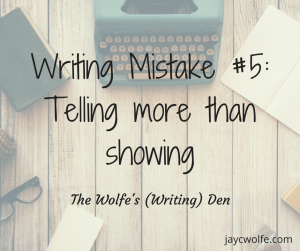 From creative writing courses to author blogs, we see this writing advice everywhere: show, don’t tell. This means that instead of outright stating a fact, you should give clues that help your readers figure the fact out for themselves. This technique is designed to create an immersive and engaging experience for your readers, and will often make the difference between a good narrative and a great story.
From creative writing courses to author blogs, we see this writing advice everywhere: show, don’t tell. This means that instead of outright stating a fact, you should give clues that help your readers figure the fact out for themselves. This technique is designed to create an immersive and engaging experience for your readers, and will often make the difference between a good narrative and a great story.
Granted, there will be times when telling is necessary because showing is impossible—such as telling exactly what a character is thinking or how an event has changed them internally—but conveying a simple idea or action in vivid imagery will add emotion and depth to your story. Instead of focusing on the idea itself, understand what makes that idea apparent and use those details to color the narrative. If a character is sad, describe the tears on her face or the way she hangs her head when someone talks to her. If it’s raining, describe your character hopping over puddles as he runs to the bus stop under a wet umbrella. Wherever possible, set the scene and let your audience fill in the blanks.
Good storytelling is not just telling people a story but bringing them on an emotional journey with you. So the next time you feel compelled to tell readers what’s going on, take a step back and assess how much you should tell and how much you can show instead. Master this balance and you’ll be one step closer to writing truly amazing stories!
How to fix this writing mistake
Read your story back and determine where the narrative falls flat. Highlight the passages that tell you something (e.g. “she was happy”, “it was a clear day”), then rewrite them in a way that will show you the same thing (e.g. “her laughter rose above the din”, “sunlight gleamed off the surface of the water”). Read through the story again and maintain the changes that make the narrative stronger.
Writing Mistake #6: Not writing!
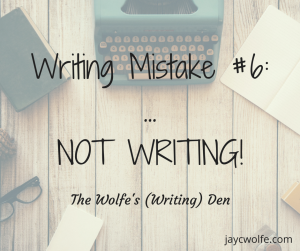 Yes, believe it or not, this is a common problem for beginning and advanced writers alike: not writing. Sounds counterintuitive, right? I mean, how can you be a writer if you don’t write?
Yes, believe it or not, this is a common problem for beginning and advanced writers alike: not writing. Sounds counterintuitive, right? I mean, how can you be a writer if you don’t write?
That’s just it: you can’t. But too many writers get so caught up in brainstorming, researching, self-editing, and worrying their work isn’t good enough that they don’t set aside enough time to actually write. It should go without saying that writing is the most important part of… well, writing, but most of the time, it’s just not that easy. When you sit for too long without doing any work, you succumb to deep-seated fears of failure and rejection, and before you know it, you stop writing before you even start.
So if you find yourself stuck in writing limbo, do yourself a favor and close your mind off to all your fears. Don’t stress about any of the other aspects of writing; just sit down and write. I know this is much easier said than done (speaking from experience), but once you get those words flowing, everything else will start to fall into place. Remember, unless you actually write, all those other steps are just a waste of time. Don’t be an “aspiring writer”; get out there and write!
How to fix this writing mistake
Write! Don’t worry about researching or editing or publishing or dealing with criticism yet. Just write. The rest will follow.
What about you? Are you guilty of making these writing mistakes? What other mistakes would you add to this list?
by Naomi L. | August 14, 2017 | Blog, Word of the Week |
Word: vituperate
Pronunciation: və-TYOO-pə-rayt / vy-T(Y)OO-pə-rayt
Part of Speech: verb
Definition: blame or insult (someone) in strong or violent language
Source: Oxford Dictionaries
Time for another vocabulary word from the Elevate – Brain Training app! This is another word I picked up from the Association game, in which the player must match a given word to one of four possible synonyms. Though I failed to correctly match this word to the verb “insult”, I couldn’t blame myself for not knowing what it meant because I’d never heard it before. After all, it’s much simpler to “blame” someone angrily than to “vituperate” them!
To “vituperate” someone is to insult or blame them in violent or strong language. The word arose in the mid 16th century and comes from the Latin verb vituperare, meaning “to blame” or “to scold”. This verb comprises two roots: the noun vitium “fault” and the verb parare “to prepare”.
Interestingly, while “vituperate” sounds similar to “vitriolic“, these words actually have different roots, the former’s being “fault” and the latter’s being “acid”. Note that “vituperate” is considered archaic, so you may want to limit its use to more old-fashioned contexts, along with its noun form “vituperator”. If your characters often blame or insult each other in a highly hostile manner, “vituperate” may be a good word to consider for your stories!
What are your thoughts on this word? Any suggestions for future “Word of the Week” featured words?
by Naomi L. | August 11, 2017 | Flash Fiction, J.C. Wolfe's Writing |
(What If? Exercise: Read the description here.)
I must be a terrible teacher.
Since college, all I ever wanted to do was teach. I studied pedagogy for years. I took student teacher positions at three different schools. And I graduated from my university with highest honors. But evidently, I was unprepared for the real challenge of being a full-time teacher.
I was sure my students would hate me just for teaching everyone’s least favorite subject. So from my first day, I tried to make math as fun and accessible as possible. I tried to create stories with numbers. I came up with scenarios that had applicable solutions. I made every effort to explain problems in a way even the slowest kids could understand. I thought if I made my class interesting enough, they would want to put in the effort to learn.
But I never saw any appreciation from my students. They never asked questions in class, even though my subject is difficult and unpopular. They never requested extra credit, even though I offered dozens of worksheets to help them pass their tests. They never came to my after-school tutoring sessions, even though I sat in my classroom for two extra hours every Tuesday and Thursday just to clear their doubts. By all accounts, they were utterly determined not to learn math.
Yet miraculously, as I sit here grading their final exam, they all seem to have passed with flying colors. Even without answers or extra credit or tutoring, not a single student has flunked my class. It’s as if they all banded together and studied hard on their own time just so they wouldn’t have to endure my class for another semester. Math is extremely difficult; there’s no way they did so well based on my lessons alone. They must have gotten help. Just not from me. Because they hate me.
There’s no other explanation. I must be a terrible teacher.
This story is based on What If? Exercise 24: “The Unreliable Narrator”. The exercise is to write a self-deceiving first-person story containing clues that the narrator is not the person she thinks she is. The objective is to create a narrator who unwittingly reveals that her judgment of people and events is too subjective to be trusted, so readers must create a more objective version of the story for themselves. I hope you enjoy what I’ve written! Thanks for reading!
Back to the story
by Naomi L. | August 9, 2017 | Blog, Creative Writing |
Do you dream of writing a book but have no idea where to start? Have you already written your first draft but need help with editing? Is your manuscript finished but you can’t seem to find an agent or publisher who will help you get it to print? Have you published a book yourself but are struggling to make it a bestseller? Or are you just curious about how to navigate the world of self-publishing?
If you answered “yes” to any of these questions, then drop everything and tune in tonight at 9 pm EST / 6 pm PST to Chandler Bolt’s live Self-Publishing School webinar: How To Go From Blank Page to Published Author In 90 Days!

What is Self-Publishing School?
Who is this Chandler Bolt, you ask? He’s the creator of Self-Publishing School, an online course that guides you through the entire process of self-publishing a book, from coming up with an idea to achieving bestseller status on Amazon! The course is designed to streamline the self-publishing process into a 90-day program, but you can complete it as quickly or slowly as you want; an SPS membership is a one-time purchase that gives you lifetime access to the course!
In tonight’s workshop, Chandler will talk about:
- the 3-step system to write, publish, and launch a bestselling book in 90 days;
- the dream-killing myths about becoming an author that are holding you back from success;
- how to find a book idea in under an hour;
- how to leverage your book to grow your authority, income, and business;
- case studies of successful Self-Publishing School students; and
- how he made $4,000/month from his first book.
And don’t be alarmed, fiction writers: while much of it seems to be geared toward nonfiction, this course is for all types of authors. Self-Publishing School does have resources specific to fiction authors, so be sure to take advantage of them if you choose to enroll!
You’ll learn much more about Chandler and Self-Publishing School by watching the webinar tonight. I’m sure it will be worth your time; it was certainly worth mine!
My Experience with Self-Publishing School (So Far)
So it’s time I let you all in on a secret: I’m finally on my way to self-publishing my first novel! I’ve been longing to write my debut novel for ages, but being the worst procrastinator ever, I never really got past the planning stage. After signing up for Self-Publishing School a few months ago, I wrote a 100,000-word fantasy novel in less than two months! I’m now in the editing phase (which may take even longer, but I’m more excited than ever), and I have a myriad of resources at my disposal for the upcoming stages of publishing and launching the book.
Aside from a lifetime-access 90-day guide, the course offers one-on-one coaching, outsourcer listings for editors and book cover designers, weekly live Q&A hangouts, and a friendly community of fellow students who all support each other through the self-publishing journey. Honestly, the community is my favorite part; writing a book can be such a lonely and confusing process, so it’s good to connect with other authors who know the struggles of self-publishing and help each other launch their books successfully!
Based on my experience so far, I’d highly recommend Self-Publishing School to any writer who’s been dreaming of writing a book for years but hasn’t yet made the leap. Don’t worry, though, there’s no need to commit yet. Just check out the live webinar tonight and then see if SPS is a good fit for you. Only you can decide if you’re ready to invest in your book and your future!
The webinar starts tonight, August 9th, at 9 pm EST / 6 pm PST! Be sure to reserve your spot now! Don’t miss it!
Disclaimer: this post contains affiliate links for Self-Publishing School. All opinions expressed here are my own. The webinar is free, but I will get a commission if you choose to enroll in SPS. Thanks for supporting my blog!


 Let’s get this one out of the way first. A common mistake many new fiction writers make (including me when I started) is to write a full story, then set it aside and never touch it again. An important rule of fiction writing: Every piece must go through editing before it’s finished. To be fair, this isn’t as big a deal with private writing, but it’s still good practice for when you’re ready to start sharing your work.
Let’s get this one out of the way first. A common mistake many new fiction writers make (including me when I started) is to write a full story, then set it aside and never touch it again. An important rule of fiction writing: Every piece must go through editing before it’s finished. To be fair, this isn’t as big a deal with private writing, but it’s still good practice for when you’re ready to start sharing your work. There’s this myth among beginning writers that the best way to be taken seriously is to sound as smart as possible. Maybe you’re insecure about your limited knowledge and vocabulary, so you stuff your stories with fancy words and fluffy sentences, then pat yourself on the back for creating distinguished and eloquent prose. Surely now you’ve proven yourself a great writer, right?
There’s this myth among beginning writers that the best way to be taken seriously is to sound as smart as possible. Maybe you’re insecure about your limited knowledge and vocabulary, so you stuff your stories with fancy words and fluffy sentences, then pat yourself on the back for creating distinguished and eloquent prose. Surely now you’ve proven yourself a great writer, right? Of all the ridiculous situations in Seinfeld‘s nine-season run, few top the time
Of all the ridiculous situations in Seinfeld‘s nine-season run, few top the time  I confess: even after writing fiction for nearly my whole life, I still have trouble with dialogue. Maybe it’s because I’m shy and have little experience talking to people, but this seems to be my Achilles heel when it comes to writing stories. If you feel this is your weak point too, don’t worry, you’re not alone. In fact, dialogue is so hard to get right that this writing mistake could take up its own blog post, but for the sake of brevity, let’s focus on the main point.
I confess: even after writing fiction for nearly my whole life, I still have trouble with dialogue. Maybe it’s because I’m shy and have little experience talking to people, but this seems to be my Achilles heel when it comes to writing stories. If you feel this is your weak point too, don’t worry, you’re not alone. In fact, dialogue is so hard to get right that this writing mistake could take up its own blog post, but for the sake of brevity, let’s focus on the main point. From creative writing courses to author blogs, we see this writing advice everywhere: show, don’t tell. This means that instead of outright stating a fact, you should give clues that help your readers figure the fact out for themselves. This technique is designed to create an immersive and engaging experience for your readers, and will often make the difference between a good narrative and a great story.
From creative writing courses to author blogs, we see this writing advice everywhere: show, don’t tell. This means that instead of outright stating a fact, you should give clues that help your readers figure the fact out for themselves. This technique is designed to create an immersive and engaging experience for your readers, and will often make the difference between a good narrative and a great story. Yes, believe it or not, this is a common problem for beginning and advanced writers alike: not writing. Sounds counterintuitive, right? I mean, how can you be a writer if you don’t write?
Yes, believe it or not, this is a common problem for beginning and advanced writers alike: not writing. Sounds counterintuitive, right? I mean, how can you be a writer if you don’t write?

Recent Comments